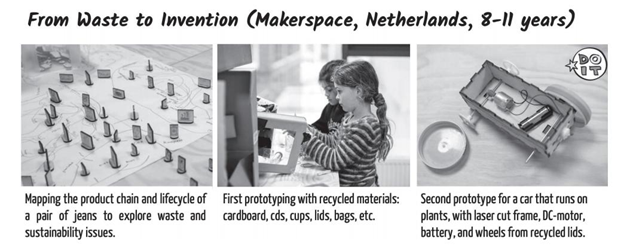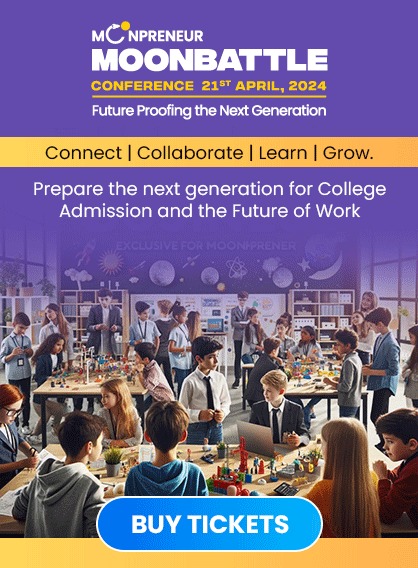
Moonpreneur
The world of education has undergone significant changes over the past few decades. The traditional methods of learning and teaching have evolved, giving way to new and innovative approaches that focus on experiential learning. One such approach is Maker Education.
Maker Education is a new-age learning revolution that promotes experiential learning. It aims to provide students with the opportunity to learn by doing, which encourages creativity, critical thinking, and problem-solving skills.
In this article, we will explore the concept of Maker Education, its benefits, and its impact on the future of education.
What is Maker Education?
Maker Education is a term used to describe the curriculum that focuses on “experience,” “innovative thinking,” and “execution by design.” It involves using various tools, materials, and technologies to create, design, and build projects.
This approach emphasizes the learning process rather than just the end product. It encourages students to explore and experiment with different ideas and to learn from their mistakes.

Source: Foundations Of Education Technology
The concept of Maker Education has its roots in the Maker Movement, which emerged in the early 2000s. The Maker Movement is a global community interested in creating, designing, and building things.
It emphasizes using technology, such as 3D printers, laser cutters, and other tools, to produce graduates better equipped to thrive in the fast-paced, technology-driven economy of the 21st century.
To celebrate the creations of students, tech enthusiasts, crafters, hobbyists, engineers, artists, and bright minds in general, Maker Faires was launched in 2006. According to Make Magazine, around 22,000 people attended the event in the first year. Today, over 200 Maker Faires are now hosted around the world, with thousands of people attending each year.
Benefits of Maker Education
Maker Education has several benefits for students, educators, and society. Some of these benefits include:
1. Encourages Creativity: Maker Education encourages students to explore their creativity and express their ideas through hands-on projects. This can help to develop their confidence in their creative abilities and foster a sense of ownership over their learning.
2. Develops Critical Thinking Skills: The critical thinking and problem-solving skills required in Maker Education can translate to other areas of student’s lives, including academics, careers, and personal growth. By learning how to approach problems from multiple perspectives and find innovative solutions, students can become more effective problem-solvers and more capable of adapting to new situations.
3. Fosters Collaboration: Maker Education promotes collaboration and teamwork among students, which is essential in the 21st-century workplace. By working on group projects, students can learn how to communicate effectively, share ideas, and work towards a common goal, which is a crucial skill in many industries.
4. Enhances Digital Literacy: As technology continues to play a more prominent role in many industries, digital literacy skills are becoming essential for success. Maker Education equips students and educators with the tools that develop digital literacy adequately and instill self-paced learning.
5. Builds Self-Confidence: Maker Education provides students with a sense of accomplishment and builds self-confidence as they see their ideas come to life.
Impact on the Future of Education
Traditional education models may not be adequate for preparing students for the challenges of the modern world. The focus on standardized testing, rote memorization, and teacher-centered instruction may not adequately develop the skills required for students to become innovators, problem solvers, and entrepreneurs.
According to a report by ResearchGate, it’s unnecessary to change schools to support self-directed or project-based learning. Several actions are being taken to inculcate a learning-by-doing approach, such as introducing AI tools and interactive computational games that foster independent inventions. Web-based learning programs are on the rise across the world. They offer a wide range of professional courses to all age groups cutting into the high school/university monopoly on certification.
These are other initiatives that educators and governments are working on to provide a learning environment that encourages students to take risks, learn from failure, and explore their interests and passions.
As Maker Education continues to gain popularity, it may lead to new approaches to teaching and learning, as well as new opportunities for collaboration and innovation in education.
Conclusion
Maker Education is a new-age learning revolution that has the potential to help bridge the gap between education and industry by providing students with real-world skills and experiences. The schools and education institutes are more than willing to invest in special maker spaces that house professional-grade equipment, material, time, and flexibility so kids can learn by doing.
Moonpreneur understands the needs and demands this rapidly changing technological world is bringing with it for our kids. Thus we are on a mission to educate and ignite the flames of entrepreneurship through our holistically created online STEM programs, which will help kids master the futuristic sciences such as Robotics, Game Development, App Development, Advanced Math, and much more!!
Register for a free 60-minute Robotics Workshop today!


















It’s worth highlighting that the Maker Movement is not confined to a specific region or country and the universality of the movement has potential to shape education on a global scale.
Is this concept helpful in this digital literacy world?
Maker Education emphasizes on digital literacy and helps students to adapt to emerging technologies as they stay updated with the latest tech trends.